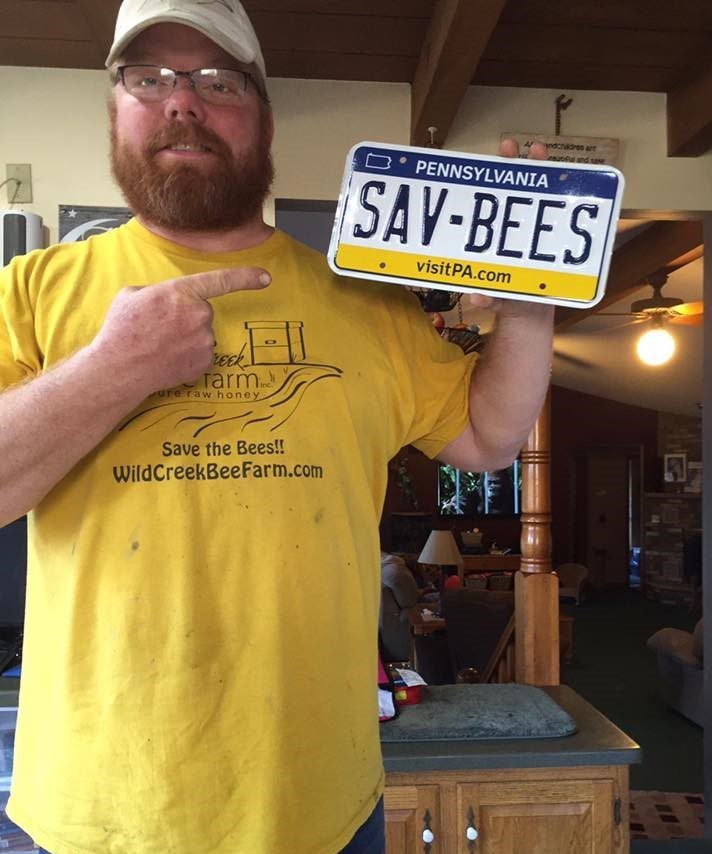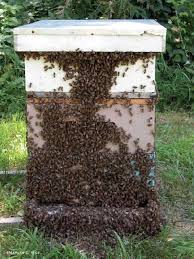Chris, owner of Wild Creek Bee Farm, is passionate about honeybees and teaching others how important they are to our food supply. He works tirelessly to bring awareness to the public about the decline in honeybees and to teach us what we can do to stop it. We asked Chris to tell us more about how he got into the honey business, why he is so committed to local honey, and what we can do to support the honey bee population.

When did you start selling honey?
“We started selling honey commercially in 2010, but I’ve been interested in bees since I was five years old.” Chris describes how his interest in bees started when he was a young boy, and had moved to a new development where there were very few kids his age. He would spend hours in the open fields of flowers and honeybees, admiring and catching them in mason jars. Over the years, he has grown to appreciate the importance of the pollination they provide for us.
Where is your operation located?
“Our operation is located in northeast Pennsylvania, where we reside. The bees are in Georgia in the winter and in the summer months they spend time in PA, NY, and VT, collecting nectar from plants that are as isolated from monoculture and chemical activities as we can manage.”
How many hives do you care for?
“In the peak of the season we care for around 600 to 1000 colonies. We breed bees and queens, and we sell bees to other beekeepers in the early spring.”
Why is it important to support local bees/beekeepers?

“It is important to support local beekeepers because a lot of time goes into keeping bees alive today. Bees have a lot of problems and we call them the four P’s: pathogens, pesticides, poor nutrition, and parasites. Bee loss is a man-made problem. Many of these pests are brought over to our country through global trading. Supporting local beekeepers helps to keep their doors open to maintain the bees that will pollinate our crops. Honey bees are responsible for 80 percent of all food pollination in the United States: No bees means no veggies and no fruits.”
What is the hardest part about beekeeping?
“The hardest part of beekeeping is the physical demand of the bees: keeping them healthy and managing all the honey boxes. Beekeeping is a year-round job. Winters are spent in the shop cleaning and building new equipment. By February, our bees are in full force building up in Georgia for a strong honey flow in the northeast. Bees must be at their strongest when the nectar flows to capitalize on a large honey crop, and a lot of work happens prior to this point. Keeping the bees mite-free and thriving is the hardest part about having large amounts of bees, as well as finding enough places to put them to thrive and produce a large crop for our customers.”
What can we do to help the honey bees?

“It’s important for folks to grow native plants that produce nectar in their gardens that don’t have neonicotinoid seed coatings. These seed coating are systemic pesticides that go into the stem of the plant, which then becomes prevalent in the pollen and nectar. Always ask if the plants are neonic-free.” Chris tells us that most flowers bought at conventional nurseries and home improvement stores have these coatings, since it is approved by the EPA. “Although approved by the EPA they are deadly to our pollinators. Many people don’t realize that these chemicals aren’t biodegradable – they remain in the soil for years. The problem with these seed coatings is that only a small percentage goes into the stem, the rest leaks into the soil and water table and winds up in our wells, drinking water, and streams. Insects and animals are drinking these poisons. Chemicals are a bio-solid made from oils. Bees have small tongues, and all the chemicals float on top of the water. When bees take a drink, what they receive is a heavy dose of the chemicals on top of the water, not just the water itself below the chemical film.”
Bottom line? “Plant nectar-producing plants, not ornamental ones, free of neonicotinoid seed coatings.” Here is a video about the lack of biodiversity from a friend of Chris’s that he recommends.
What is your favorite way to enjoy honey?
“I enjoy all types of honey but my favorite way to enjoy it is on top of yogurt, granola, and ice cream.”
Wild Creek Bee Farm’s quality chemical-free products include Wildflower Honey, Goldenrod Honey, Clover Honey, and Creamed Honey. When you purchase Wild Creek Bee Farm honey, you are directly impacting the state of the bees that Chris manages in the northeast.





